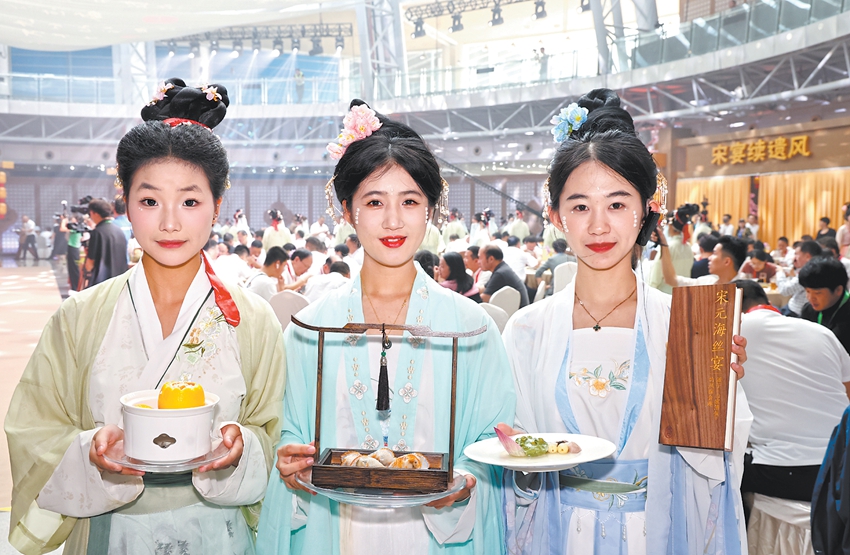- About
- Sustainability
Quanzhou Evening News, April 18 – By journalist Song Yao and correspondent Lu Yanhong
Where Mountains Meet the Sea: An Epic of Flavour
Cradled between mountains and the sea, Quanzhou has long embraced an "ocean-as-field" way of life. This unique geography gave rise to a culinary tradition blending the bounty of both land and water. Signature dishes such as Chongwu's fish rolls crafted from Spanish mackerel, translucent grass jelly made from marine algae, and the iconic oyster omelette celebrate this natural symbiosis.
As documented in Shanjia Qinggong (A Hermit's Delicacies), local fishermen once simmered mountain bamboo shoots with fresh seafood, seasoned simply with pepper—an early expression of land-sea fusion that still shapes regional tastes today.
The Song-Yuan era marked a maritime golden age, bringing global ingredients through seaborne trade. Pepper, sweet potatoes, peanuts, and curry arrived with foreign merchants. Arab traders introduced coriander and sesame, while chili—then called "foreign pepper"—revolutionised local flavour profiles. Among the culinary gems is Quanzhou's beloved beef soup, blending Arab-style cuts, Central Chinese slow-stewing techniques, and sweet potato starch brought back from Luzon by Ming merchant Chen Zhenlong. In later generations, returning overseas Chinese added innovations like "curry beef steak with salted rice," now a favourite across social media.

Faith, Flavour, and Festival: A Culinary Mosaic
As a historic crossroads of trade and world religions, Quanzhou's foodscape reflects its spiritual diversity. Often called a "living museum of world religions," the city serves halal beef soup alongside Buddhist vegetarian cuisine. Taoist principles shape seasonal dishes like runbing (spring rolls), while Mazu's birthday—celebrating the sea goddess—is marked with the ritual Suoluolian feast.
Here, cuisine is a vessel of faith and fellowship. In every neighbourhood, dishes convey interfaith harmony, shared heritage, and everyday cultural coexistence.
Wisdom from the Waves: The Sea's Culinary Philosophy
Generations of maritime life have cultivated a deep respect for simplicity and nature in Quanzhou's cuisine. Minimalist techniques—known locally as "Cooking with Rustic Charm, Celebrating Original Flavours"—preserve the purity of flavour. Spanish mackerel soup is infused only with ginger; poached octopus is served with nothing more than soy sauce. This "art of simplicity" represents inherited wisdom passed down through centuries.
Portable dishes such as oyster omelettes and fish skewers once nourished seafarers on long voyages. These practical meals evolved into regional staples. Today, science confirms what tradition intuitively understood: umami thrives through the synergy of amino acids, inosinate, and guanylate. Quanzhou's food was quietly scientific—long before the science.
From Heritage to Innovation: Flavour as Cultural Capital
Quanzhou is now channelling its UNESCO World Heritage status into a culinary renaissance. The "One County, One Signature Banquet" campaign celebrates local identities:
Shishi revives Song-Yuan recipes from Shanjia Qinggong
Nan'an honours Ming loyalist Koxinga with the Zheng Chenggong Family Banquet
Dehua combines ceramics and cuisine in the Porcelain Capital Banquet
Fengze transforms Xunpu women's floral headdresses into edible art through the Floral Feast
Quanzhou's global culinary reputation is growing. At UNESCO headquarters in Paris, a "Chinese Elegance" banquet featuring Quanzhou dishes earned wide acclaim. At the 2024 Fujian Cultural and Tourism Economy Conference, local favourites such as tusundong (marine jelly), mandarin orange cakes, Anxi tofu, ginger duck, and beef soup captivated both critics and visitors.
Recognised as one of the "100 Classic Asian Destinations for 2025," Quanzhou is gaining international recognition. Travel guides now recommend climbing Mount Qingyuan, visiting the historic Kaiyuan Temple, and experiencing a Maritime Silk Road banquet—a sensory journey through a millennium of flavour. With 14 Michelin-rated restaurants and a goal of ¥50 billion in annual food and beverage revenue, the city is shaping its future as a global culinary destination.
Ocean at the Table, Culture on the Plate
From its historic rise as the "First Port of the East" to its aspirations as a "City of Gastronomy," Quanzhou continues to blend tradition with innovation. Here, food is more than sustenance—it is a cultural epic, written in salt, sea, and time.
As the new slogan "Quanzhou Savor, Global Flavor" echoes across continents, this culinary revival invites the world to rediscover the soul of China's southern coast—one unforgettable bite at a time.
